Solarenergie für Afrika
Konferenz in Düsseldorf vom 4.-6. September 2003
School co-operation between Germany and Africa
with special reference to Ghana
Dr. Sam Essiamah
The rapid Rain Forest degradation is one of the greatest global problems threatening the survival of humanity today. West Africa for example has lost three thirds of its virgin forests through uncontrolled forest clearing. Besides, the Sahara has advanced during the last decade at an average rate of 2, 5 km per year southwards.
Consequently, the impact of the increasing degradation is remarkable. In Ghana, for instance, the Rain Forest decreased just within a period of 40 years from 8 to 1, 8 Million hectares.
Without the forest, intensity and period of rainfall change, the vegetation disappears and the soil erosion increases. In spite of these alarming results, the rest of the forests are being used unsustainably. According to the Ghanaian forestry Authorities (www.ghanaweb.com of 27.8.2003), Ghana is likely to loose its forest cover under 20 years if reforestation activities are not intensified. Reforestation is therefore extremely necessary if the children and the country are to have a secured future.
A change of attitude of the population towards forest resources is indispensable. It is however difficult to convince the older generation who have until now lived with the forest and have already formed negative habits of uncontrolled utilisation of the resources to give up their erroneous thinking that there is still plenty of forest resources. However children, especially school children on the other, are easy to win for such a change. This is because they are now forming attitudes and learning form current realities. More importantly, deforestation has direct consequence for the school children in Ghana and in Africa as a whole. In former times, children could study under shade trees but now most parts of their school compounds are void of trees. They have been ripped off those wonderful environments and now what they see is marks of erosion and dusty compounds.
Therefore, In December 1995 Dr. Essiamah initiated a Project "Tree Planting on School Compounds in Ghana" with four (4) schools in the Central and Eastern Regions of Ghana, whereby school children under the supervision of their teachers, plant and tender for shade trees on their school compounds. School children were preferred because they are the future leaders and the backbone of every nation. Furthermore one does not need to negotiate for land for the Project since degraded school compounds are already available everywhere, over 9000 primary schools in Ghana alone.
The aims of the Project were not only to give shade to the schools for the children to play under, protect the buildings against storm, the compound against encroachment of private builders, protecting the soil against erosion but also help change their attitude towards forest or trees when they grow up and also for the community, through the project, to also come to acknowledge the importance of trees.
The Project began in 1995 with 4 schools but the number of schools involved has now increased to 66. Already, one success story is that a school at Koforidua, which was involved in the Project right from the beginning, won the first (1st) Prize of the Ghana Government Reforestation Programme in 1998.
The project is also being introduced into German schools to win Partnerships for Ghanaian schools involved in the Project. Several schools have already gone into partnership with schools in Ghana, some of them winning UNESCO prizes with the Project "Trees for Ghana".
Among the schools which have embraced the Project with enthusiasm are "Geschwister-Scholl-Gesamtschule in Göttingen", "Albert Schweizer Schule in Adelebsen" and "Schule am Habbrügger Weg in Ganderkesee".
Apart from school Partnerships, the Association has introduced Forest sponsorship on school compounds. The aim is for individuals or Institutions like church communities or Third world shops to sponsor school forests in Ghana. The first forest sponsoring are been undertaken by Maria-Friede-church community in Göttingen and a Third world shop Dettinger Weltladen in Konstanz.. A sign board with the name of the donor, for example "Dettinger Forest project" will be displayed at the forest site.
It is being publicised in Germany through presentation at events and through reports in Journals and Local Newspapers.
Activities on the projects do also appear in Ghanaian papers.
Establishment of Tree Nursery at Ochiso in the Central Region:
With the support of a German foundation (Bingo Lotto Nierdersachsen) a tree Nursery is to be established at Ochiso in the Central Region. A 10 ha land has been acquired and work is to start soon. For reasons outlined below the nursery should be of great importance because it will not only supply free seedlings to schools but also for large degraded areas which the Government wants to replant.
- Even though the Government has made it a target to plant 20,000 ha degraded lands per year, there are no big private nurseries to contribute effectively to this task. Small individual nurseries for example may not cultivate seedlings from seeds of good selected mother trees (no seed banks)
- From economic point of view, the Government is encouraging Mono-culture like Teak plantations without investigating future ecological disadvantages (scarcity of animals, flora and soil fauna).
The Nursery is to have plots with various combinations of indigenous tree species to serve as show garden and give information to interested people. The Gardener of the Association in Ghana, Mr. Bernard Anwi-Sey, has already got experience with such plantings on school compounds. His 3-month practical training in Tree Nursery Management here in Germany which he has just finished and returned home would enable him man the Nursery.
Since mid July, two students with support from the "Carl Duisberg Foundation", are in Ghana for three months to help plan the Nursery and involve themselves in the environmental education at the schools involved with the Project. Two more students will follow in October 2003.
Students and young workers who are interested in involving themselves in such Projects can examine the offers under www.asa-programm.de
Since over 70 % of Energy demand in Ghana is met by fire wood, the provision of alternative energy is indispensable in order to secure the long term success of the reforestation programme.
As part of the strategy of the Project therefore, solar equipment such as solar cookers and lamps are being introduced in schools since 1997 as incentives to propagate the idea of reducing pressure on the use of trees as fuel wood.
A recognised voluntary Association, "School Forests for West Africa e. V." of Germany, (formerly Study Group Rainforest for Africa) "with special reference to Ghana and a newly founded Association in Ghana Youth and Environment Club", recognised as a voluntary Organisation, attend to the Project. Apart from distributing trees to schools, the Association in Ghana is also involved in environmental education (Campaign for environmental awareness). By initiating Youth and Environment Clubs in schools, it educates the students and pupils in taking care of the planted trees.
The Association intends to extend its activities to schools in other regions of the country especially the Northern Region where afforestation is a chance of survival. It also wants the project in Ghana to be model to be extended to other West African Countries facing the similar problems.
Since the Project is not being supported by any Governmental Organ in Ghana, it has been financed up to now through donations and sales from Ghana-made articles such as "weaved Kente ", flying and bow ties, Bookmarks, Postcards and other items. These items can be ordered from the address given below.
The foundation is now laid but with over 9000 Primary Schools in the country waiting to be involved, there is still a lot to be done.
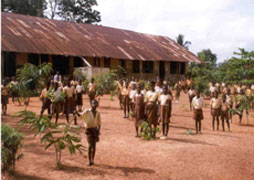 School Children Planting their desolated Compound School Children Planting their desolated Compound
Beginning of the Project: Mid 1998 |
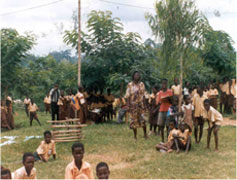 Little Oasis springs from their depleted Compound Little Oasis springs from their depleted Compound
Condition of Planting after 16 months, Sept. 2000 |
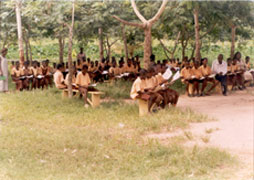 Lessons under Trees like former Times - April 2002 Lessons under Trees like former Times - April 2002 |
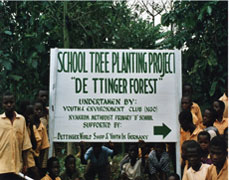 Condition of the Planting after 3 years, Dec. 2002 Condition of the Planting after 3 years, Dec. 2002
Forest Sponsorship - "Dettinger Forest" in Ghana |
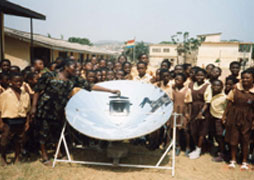 Demonstration of a Solar Cooker to School Children Demonstration of a Solar Cooker to School Children |
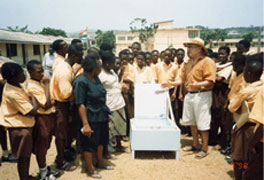 Explanation of how Solar Oven functions Explanation of how Solar Oven functions |
 School Children Planting their desolated Compound
School Children Planting their desolated Compound Little Oasis springs from their depleted Compound
Little Oasis springs from their depleted Compound Lessons under Trees like former Times - April 2002
Lessons under Trees like former Times - April 2002 Condition of the Planting after 3 years, Dec. 2002
Condition of the Planting after 3 years, Dec. 2002 Demonstration of a Solar Cooker to School Children
Demonstration of a Solar Cooker to School Children Explanation of how Solar Oven functions
Explanation of how Solar Oven functions